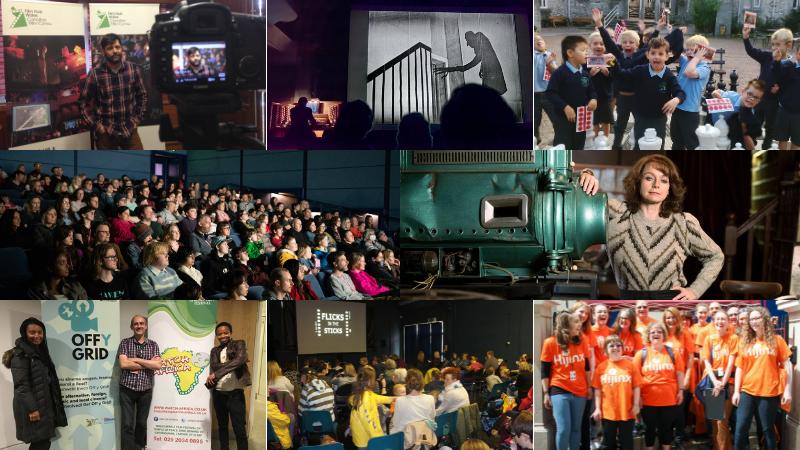
Welsh Cinemas Celebrate Film Hub Wales’ 10th Anniversary
It’s our tenth Birthday! We’re looking back to this time in 2013, when we launched a significant new programme in partnership with Welsh cinemas, film festivals and community screens, designed to build audiences for British independent and international film across Wales.
This has all been made possible thanks our partners in exhibition and across BFI FAN, with funding from The National Lottery via the BFI. Join us for a look back at just a fraction of what we’ve achieved together over the last decade.
Watch video messages from our members below, along with a special ten year video edit, plus our press release, ten year highlights and social stories:

The Eternal Daughter: The Whole Story
The Eternal Daughter comes to cinemas across Wales and the UK in November 2023.
We’ve created a Made in Wales Support Pack for this film, featuring an exclusive video introduction from Welsh actor Carly-Sophia Davies, social cards, programming recommendations and social assets, all of which you can share with your audiences to promote the film’s Welsh connections.

New Three-Year Community Cinema Project to Launch across North Wales
19th September 2023
TAPE Community Music and Film are launching a new cinema project for communities across North Wales, with support from Film Hub Wales.
TAPE Community Music and Film are launching a new cinema project for communities across North Wales, with support from Film Hub Wales.
Specialising in creative inclusion, TAPE have ‘co-created’ the project in collaboration with their Media Club – a safe and supportive space which offers hands on experiences to a cohort of people from across the local community.
‘Neighbourhood Watch’, named by Josh one of the Media Club members, will launch with a screening of locally filmed, BAFTA nominated, comedy Brian and Charles at Llanrwst Family Centre on Friday 22nd September. There will be special guests and some surprises for the audience!
Josh is looking forward to the first event:
I like the idea of bringing the community together through film. I feel proud to be part of this.
Steve Swindon, Creative Director of TAPE explains how the Media Club works and why the project is needed:
We can bring people together through Media Club and work as a team to develop exciting projects which link to a whole range of creative opportunities. Neighbourhood Watch is a hugely exciting project for several reasons. It builds on the film programming work the group has done and the wide range of screenings and events they’ve hosted. It also moves this work into communities across North Wales and connects people in new ways through the workshops running alongside. We can’t wait to get started.
Neighbourhood Watch will bring monthly screenings of UK independent and international film to up to five communities from 2023-26, with potential areas for expansion including Anglesey and Llanfairfechan. The communities involved will have opportunities to develop skills such as booking films and marketing events, whilst also making friends and growing their professional networks. Each screening will have a workshop, guest or masterclass, plus the chance to participate in the development of TAPE’s next feature film project, Below the Waves, which is funded by the Arts Council of Wales.
Hana Lewis, Head of Film Hub Wales adds:
There’s so much innovation taking place across North Wales but we know that communities aren’t always able to access events, whether this is due to the cost of living crisis, poor transport links or lack of local services. Neighbourhood Watch is driven by the community itself, creating an appetite for film on their own doorsteps. TAPE’s Media Club are bursting with creative ideas to make the project work for their community in an inclusive way – which is really important to us. We hope that their work will encourage wider cinema going, supporting nearby cinemas and festivals in the long-term.
BFI FAN is a nationwide programme made possible thanks to National Lottery funding that seeks to ensure the greatest choice of cinema is available to everyone across the UK. In Wales, funds are administered by Film Hub Wales via Chapter. The Neighbourhood Watch project is designed to meet objectives in the BFI’s recently launched 10-year strategy, Screen Culture 2033.
More than £30M is raised each week for good causes across the UK by the National Lottery.

BFI Cinema Unbound: The Creative Worlds of Powell and Pressburger comes to big screens UK-wide this Autumn
15th September 2023
Cinema Unbound: The Creative Worlds of Powell and Pressburger, a major BFI UK-wide film celebration of one of the greatest and most enduring filmmaking partnerships in the history of cinema: Michael Powell (1905-1990) and Emeric Pressburger (1902-1988), best known for their iconic films including THE RED SHOES (1948), A MATTER OF LIFE AND DEATH (1946) and BLACK NARCISSUS (1947), comes to big screens nationwide this autumn. CINEMA UNBOUND: THE CREATIVE WORLDS OF POWELL AND PRESSBURGER today announces a UK-wide programme, funded by National Lottery, with over 56 special events and screenings, in the first round, supported in partnership by BFI Film Audience Network (BFI FAN).
From Martin Scorsese to Matthew Bourne, Kate Bush to Margaret Atwood, Tilda Swinton and Greta Gerwig, Powell and Pressburger have influenced creatives for decades, their bold, subversive and iconoclastic cinema continuing to resonate across the worlds of art, design, theatre, dance and music. This is the largest and most wide-ranging exploration ever undertaken about the work of the legendary writer-producer-director team. Michael Powell and Emeric Pressburger’s incredibly fruitful artistic collaboration at their production company, The Archers, spanned 24 films together made between 1939 and 1972.
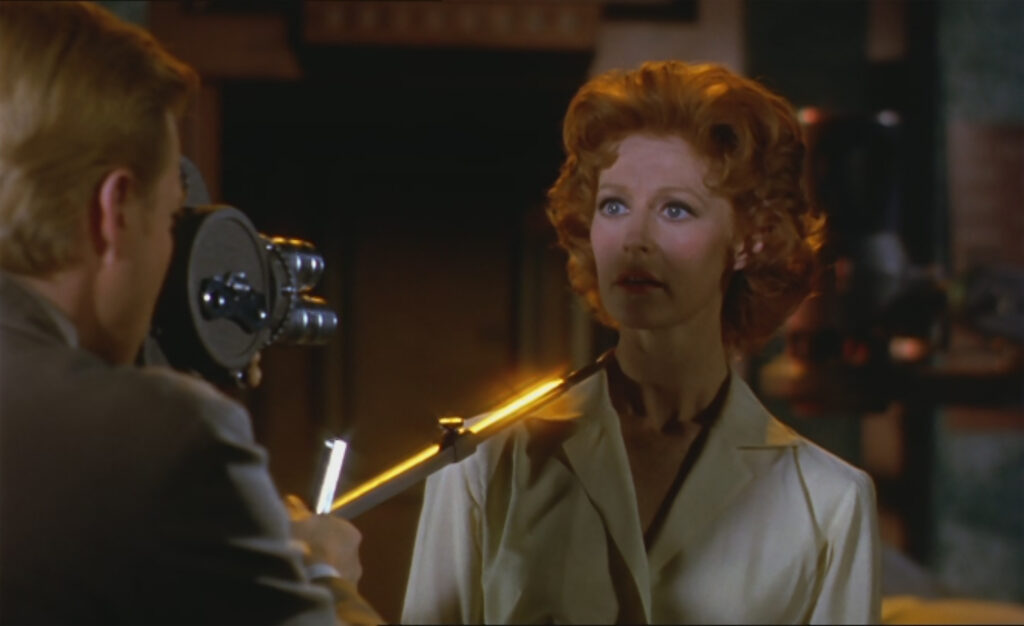
The UK-wide celebration kicks off this autumn on the big screen with the BFI Distribution re-release of I KNOW WHERE I’M GOING! (1945), back in UK-wide cinemas from 20 October. I KNOW WHERE I’M GOING! was recently restored by the BFI National Archive and The Film Foundation in association with ITV and Park Circus, with funding for the restoration provided by the Hobson/Lucas Family Foundation with additional support provided by Matt Spick. BFI Distribution is also re-releasing the iconic dance film THE RED SHOES (1948), in honour of its 75th anniversary from 8 December. THE RED SHOES was previously restored by the UCLA Film & Television Archive in association with the BFI, The Film Foundation, ITV Global Entertainment Ltd., and Janus Films. Restoration funding for the film was provided by the Hollywood Foreign Press Association, The Film Foundation, and the Louis B. Mayer Foundation. Both restorations have been licensed from Park Circus/ITV. A new restoration of PEEPING TOM (1960) restored by the BFI National Archive and The Film Foundation in association with Studiocanal will be released in UK cinemas by Studiocanal on 27 October.
Studiocanal will also be unveiling a new 4K restoration of THE SMALL BACK ROOM (1949) as part of CINEMA UNBOUND. Restored by the BFI National Archive and The Film Foundation in association with Studiocanal, THE SMALL BACK ROOM will be available via Studiocanal as well as a first ever DCP print for OH…ROSALINDA!! (1955). BFI FAN partners nationwide will also be able to book classic Powell and Pressburger’s titles, A MATTER OF LIFE AND DEATH (1946), BLACK NARCISSUS (1947), and double bills of THE EDGE OF THE WORLD (1937) + RETURN TO THE EDGE OF THE WORLD (1978) as well as the recent restoration of Michael Powell’s BLUEBEARD’S CASTLE (1964) + THE SORCERER’S APPRENTICE (1955). BLUEBEARD’S CASTLE (1964) has been restored by the BFI National Archive and The Film Foundation in association with The Ashbrittle Film Foundation, with funding provided by the BFI National Archive, The Louis B. Mayer Foundation and The Film Foundation. The sublime new restoration of BLUEBEARD’S CASTLE (1964) will also be released by the BFI in a Dual format edition (DVD & Blu-ray) in November.4
Following the huge success of the inaugural BFI Film on Film Festival in June, the season will offer UK-wide audiences a chance to experience the magic of seeing films projected on film, with 35mm print screenings of BLACK NARCISSUS (1947), THE RED SHOES (1948), THE LIFE AND DEATH OF COLONEL BLIMP (1943) and THE TALES OF HOFFMANN (1951), with new prints made with funding from the National Lottery and the additional support of donors to the BFI’s Keep Film on Film campaign.

Programme highlights up and down the UK and Northern Ireland include aroma-focused immersive screenings of BLACK NARCISSUS (1947) in Chester, Brighton and Glasgow, a series of screenings in Orkney, Mull, the Isle of Tiree and Oban, celebrating Powell and Pressburger’s Island films including I KNOW WHERE I’M GOING! (1945) and THE EDGE OF THE WORLD (1937). Special screenings planned at Much Wenlock, Shropshire, the location for GONE TO EARTH (1949) and Leonardslee Lakes and Gardens, West Sussex one of the key filming locations for BLACK NARCISSUS (1947). Other event highlights include an immersive screening of THE RED SHOES (1948) at Exeter Cathedral and A MATTER OF LIFE AND DEATH (1946) at Nympsfield Airfield Aerodrome, Gloucestershire. Plus, Powell and Pressburger film seasons at cinemas across the country from Cardiff, Derry, Belfast, Glasgow, Nottingham and Sheffield, to Dundee, Folkestone, Cambridge and Manchester.
Powell and Pressburger’s masterpieces were so numerous that in 2022 six of their films appeared in the Sight and Sound Greatest Films of All Time Poll (a feat only matched by Hitchcock). True cinematic visionaries, Powell and Pressburger worked with an exceptionally talented creative team of long-term collaborators as The Archers. This included Alfred Junge (production designer), Hein Heckroth (production designer and costume designer), Jack Cardiff (cinematographer), Ivor Beddoes (sketch artist), Arthur Lawson (art director) and Brian Easdale (composer) as well as actors including Roger Livesey, Anton Walbrook, Moira Shearer, Deborah Kerr, Kathleen Byron and Sabu. Together they created some of the richest and most memorable films in the story of cinema, the impact of which continues to be felt today.
Members of Film Hub Wales can still apply for funding to present events and screenings that celebrate the work of Powell & Pressburger and their influence. Read our funding guidelines and submit an application.
ENDS.
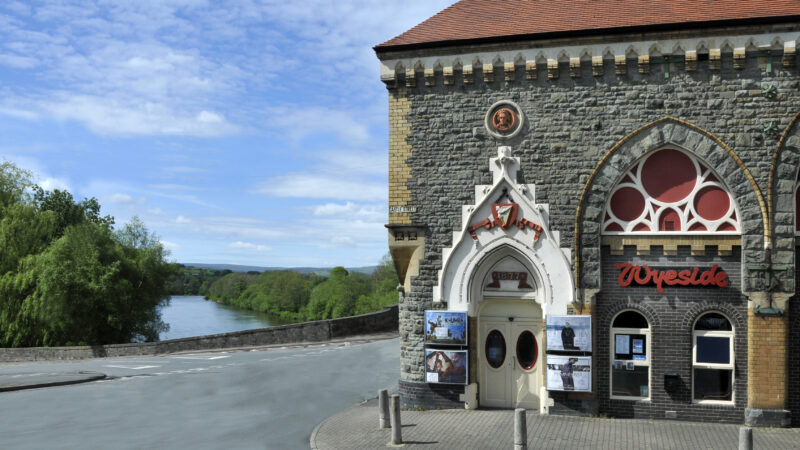
From Climate Culture to Free Family Films: What’s on in Welsh Cinemas
4th July 2023
Film Hub Wales (FHW) has awarded £50,000 of National Lottery funding to nine independent cinemas and film festivals in Wales through its Film Exhibition Fund.
Funds will enable Welsh communities to watch the latest UK independent and international films on their doorsteps. From queer animated shorts in Cardiff, to live music and film nights in Tywyn, there’s a huge variety of activities to choose from.
The funded projects share the aim to offer climate conscious events at affordable prices. Wales One World Film Festival are running their ‘Ecosinema’ event with the theme of ‘Another World is Possible,’ which includes two short climate stories on screen from Bangladesh and an event in partnership with the Land Workers Alliance, all on a ‘pay what you feel’ basis.
Annita Nitsaidou, Marketing Officer at WOW Festival explains why these are important themes for WOW in 2023:
The climate and cost of living crises are two issues that are as local as they are global, just like Ecosinema. We want to accentuate the urgency of climate change, its global nature and the need for sustainable solutions – reminding us all that ‘Another World is Possible’. We have always believed in the power of storytelling to create social change and by making ‘Ecosinema’ accessible with our ‘pay what you feel’ offer, it will continue to offer a platform for filmmakers, activists, and audiences to come together and engage in meaningful conversations. A space where people can learn, be inspired and be part of a community that is committed to making a positive difference in the world.
Cardiff Animation Festival (CAF) have a host of events on offer all year, from free monthly screenings at their Cardiff Animation Nights, to regular free family film club screenings at both Chapter in Canton and Oasis’ centre in Splott. They are also continuing their ‘Planet Positive’ strand of screenings and talks on how animation can help fight the climate crisis.
Festival Director, Lauren Orme explains how CAF is creating a community around animation in Wales:
CAF is all about bringing people together around a love of animation. We’re running a year-round programme of films, talks and activities people can get involved in, to nurture the kind and welcoming community we’ve built around animation over the past nine years – which is more important than ever after lockdown. We’re making our programme more accessible and inclusive through captioning and BSL interpretation, and making our events free wherever we can. We’re really grateful for the continued support of Film Hub Wales, who have helped CAF to grow since our first festival.
Other highlights Wales wide include free films for families at the Magic Lantern in Tywyn and special climate conscious events as part of the ‘Greener Tywyn’ initiative. At Kotatsu Japanese Animation Festival there will be a free Manga café alongside events, where audiences can read Japanese comics after watching a film. At Cellb in Blaenau Ffestiniog, they have monthly Youth PicZ screenings where their Clwb Clinc youths can watch films at affordable prices, whilst also building their skills in front of house, projection, technical and media techniques.
Hana Lewis, Head of Film Hub Wales explains why funding for exhibition is so important:
The Film Exhibition Fund exists to help cinemas, festivals and community screens to bring the best UK independent and international films to audiences right across Wales. Welsh exhibitors are navigating serious challenges like the cost of living crisis, whilst also adapting at a time of global climate crisis. This is no easy thing to do but they never fail to think creatively – meaning that Welsh cinemas and festivals are still the best places to watch films and for audiences to enjoy an affordable night out. Investment to preserve these community services is crucial.
The projects are supported by Film Hub Wales, which is part of the BFI Film Audience Network (FAN) using funds from the National Lottery to ensure the greatest choice of cinema is available to everyone across the UK. Funds in Wales are administered by FHW via Chapter as the Film Hub Lead Organisation.
More than £30M is raised each week for good causes across the UK by the National Lottery.
Download the full press release here
-ENDS-
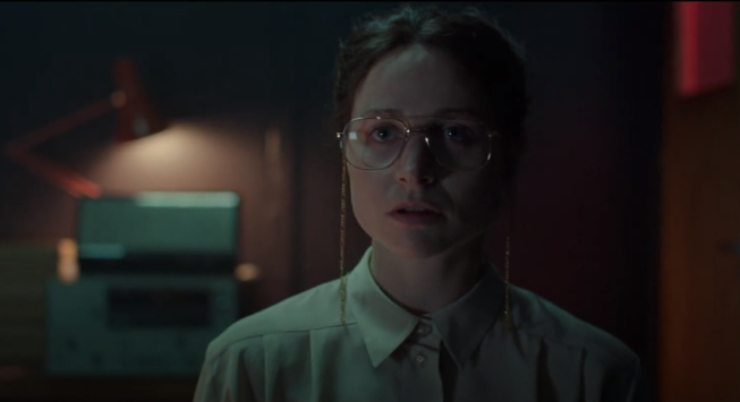
New Report Reveals Welsh Film Diversity Data and Box Office Performance
Wednesday, 7th June 2023
Film Hub Wales has released a report examining the performance of 14 key films with Welsh connections released in cinemas between March 2021 and March 2022.
The films, which range from Prano Bailey Bond’s Censor, to Lindsay Walker’s The Welshman, were selected as a sample from 20 known titles, reflecting a range of release strategies and sizes. All titles benefitted from the support of Film Hub Wales’ Made in Wales (MIW) strategy, which is funded by Creative Wales and the BFI. Welsh connections include where films were set or filmed in Wales, or made by or featuring Welsh talent.
This unique report, which was written by distribution consultant Delphine Lievens, leads on from an equivalent study commissioned by Film Hub Wales in 2020. It outlines a range of key data including how Welsh films are funded, produced, marketed and distributed, along with a range of diversity statistics. The aim of the work is to create new benchmarks against which emerging trends in Welsh audience behaviour can be explored annually, enabling the screen industry to respond.
Film Hub Wales Manager, Hana Lewis explains:
We take inspiration from countries such as Sweden where they routinely publish data about the performance of their homegrown films and use this to inform future productions as well as distribution and sales strategies. There’s a lack of shared data about film in Wales and we believe by developing this work we can better understand how audiences respond to on-screen content and interrogate issues around equity, prioritising films that explore fair representation. It also enables us to understand how well Made in Wales is working as a scheme, so we can tailor our support and ensure Welsh stories reach audiences.
The 14 titles reviewed for this report took £1.1million at UK and Ireland box office, with 13% of those admissions in Wales (an increase of 2% since 2020). Three quarters (77%) of the films exceeded the 3.15% average market share for 2021 Welsh box office. The report shows that smaller Welsh-set or Welsh story-based releases were popular with cinemas and their audiences in Wales. It highlights films such as The Welshman which had 100% of its screenings in Welsh cinemas; La Cha Cha, which took 99% of its box office from Welsh sites and The Toll, which made 83% of box office takings within Wales.
Director of The Welshman Lindsay Walker explains how important the support of Welsh cinemas and Made in Wales was to the release of the film:
It was so important that The Welshman screened at local cinemas, it was special! It brought communities together and gave a bigger sense of pride to our history in Wales. Having the film screened at independent cinemas during the pandemic allowed smaller cinemas to open and put audiences back into seats and Made in Wales helped us to achieve that. It’s amazing what film can do by bringing people together.
One of the key findings of the report is that despite a growing commitment to equity and inclusion within the UK film industry, none of the 14 films analysed were directed, produced or written by Black or non-Black people of colour, which was a decrease from 4% in 2020. Although there was a 32% increase in women directors and 10% increase in women producers, none were filmmakers of colour. There was a 2% increase in lead credits for actors from non-white backgrounds (from 7% to 9.38%).
Ila Mehrotra, Director of upcoming feature Being Hijra (2023) documenting India’s first transgender modeling agency, explains why stories from diverse filmmakers are crucial for Wales:
When we are given then chance to tell our own stories, then tokenism becomes a thing of the past, but in order to get there the film industry needs to provide us with well-paid, creative opportunities that create long-term financial and creative stability in our lives. Only then will we see real change in front of and behind the camera.
Other key data included that there were no Welsh language features released during the period (a decrease from one film, Anorac, in 2020). It is anticipated that this will improve significantly over the coming years with the announcement of the new Sinema Cymru Development Fund.
Gerwyn Evans, Deputy Director, Creative Wales adds:
This type of research is so important as it helps to provide an accurate picture of the film sector in Wales and enables us to identify areas where we must do a better job of reflecting and representing our communities. While it is encouraging to see an increase in the representation of female directors in the screen industry in 2021/22, it is clear that there is a lot still to do to challenge the lack of diversity and inclusion across Film and TV. Creative Wales is committed to driving change in this arena through continued partnership working, financial support and supporting trainee schemes. Our mission is to tackle these issues head on and, in turn, create more opportunities for people from all backgrounds, at every stage of their career in screen.
Films meeting wider inclusion criteria may have been funded between March 2020 and March 2021 but not released, and were therefore ineligible for analysis in this report. Film Hub Wales is committed to undertaking this research annually, subject to funding, and is working on a selection of titles with diverse talent, releasing in 2023.
Film Hub Wales’ MIW project offers year-round activities in partnership with Welsh exhibitors, including a film catalogue, which hosts over 700 shorts and features with Welsh connections. MIW is made possible thanks to direct support from Welsh Government via Creative Wales and the BFI Film Audience Network (FAN), awarding funds from the National Lottery. BFI FAN offers support to exhibitors across the whole of the UK, to boost cultural programming and engage diverse audiences. In Wales, activity is led by Film Hub Wales, managed by Chapter.
Audiences can keep up to date with news of the upcoming Welsh releases on the Made in Wales section of Film Hub Wales’ website, or by following @Filmhubwales on social media.
-ENDS-
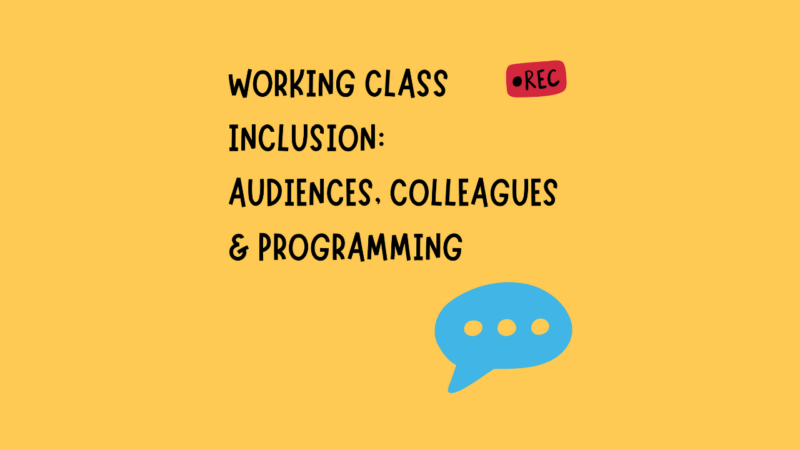
Resource: Working Class Inclusion
Inclusive Cinema’s podcast series, Working Class Inclusion: Audiences, Colleagues & Programming, provides information and guidance to support exhibitors in improving cinema experiences for working-class people and those in poverty.
The resource comprises a series of six podcast episodes that cover a range of areas, from sliding-scale ticketing and equitable employment practices, to the films that are programmed and how they are presented.
There is also an access and inclusion checklist to support venues, festivals, industry initiatives and event organisers with strategic and operational measures to welcome working-class audiences and colleagues.
The series is presented by Dr. Leanne Dawson, senior lecturer in Film and Diversity and Inclusion Consultant.
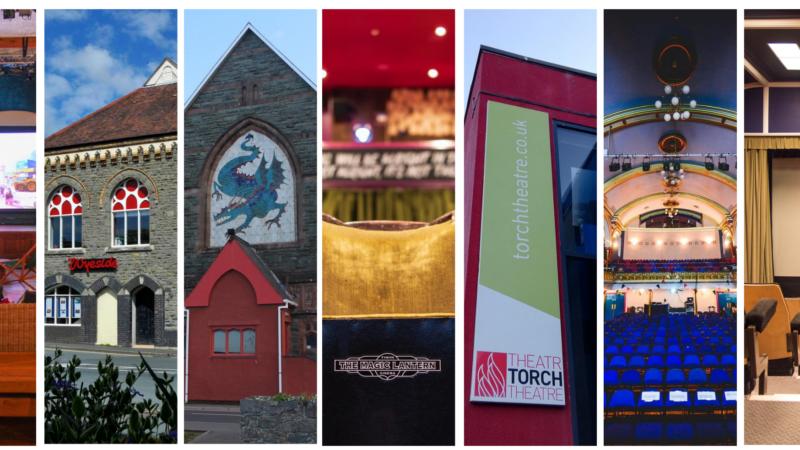
Film Hub Wales to Support Seven Welsh Cinemas with the Cost of Living Crisis
7th March 2023
Seven independent cinemas across Wales will receive funding from Film Hub Wales to support their venues with rising costs this spring.
As venues balance significant financial pressures, funds will be used to ensure that the best UK independent and international films continue to reach communities at affordable prices.

Working Class Inclusion
New resource published focusing on creating better experiences in cinema spaces for those from working-class backgrounds and/or those in poverty.
Working Class Inclusion: Audiences, Colleagues & Programming is a free resource to help cinemas be more inclusive.
Inclusive Cinema is launching a new free resource: Working Class Inclusion: Audiences, Colleagues & Programming, providing information and guidance to support exhibitors in improving cinema experiences for working-class people and those in poverty.
The resource comprises a series of six podcast episodes that cover a range of areas, from sliding-scale ticketing and equitable employment practices, to the films that are programmed and how they are presented. There is also an access and inclusion checklist to support venues, festivals, industry initiatives and event organisers with strategic and operational measures to welcome working-class audiences and colleagues.
Addressing the wider social context and responding to the omission of class or socio-economic position in the UK’s 2010 Equality Act, Dr Leanne Dawson (equality, diversity, and inclusion consultant, author, and academic in Screen Studies) was commissioned to explore the impact of cultural, social, and economic barriers on working-class people and their engagement with independent cinemas and pursuing careers in the industry.
Through sharing research and personal experiences, the series provides practical guidance and encouragement for organisations, outlining how positive interventions can lead to increased diversity across audiences and the workforce. It looks at the definition of ‘working-class,’ which groups many different experiences together — some people raised in poverty, others not, some in towns, some rurally, some with multiple diverse characteristics — and considers social mobility between classes and the impacts of financial income and cultural capital to participation in independent cinema.
Checklists outlining inclusion strategies and measures will accompany the podcasts. A film programming resource will also highlight the rich diversity of working-class stories and talent behind and in front of the camera, covering fiction features, documentary and short film. This will be complemented by ideas to make screenings available and more welcoming to working-class audiences, colleagues, as well as creatives, resulting in a deeper engagement with independent films and venues. Booking details and information on access materials, such as descriptive subtitles and audio description, will also be provided where possible.
Dr. Dawson explains why putting this resource together should be helpful to the exhibition sector:
I really want to help you make your cinema, festival, screening, or event as welcoming as possible to all working-class people. This series of resources comprises podcasts offering practical tips on how to attract and welcome more working class people and accompanying checklist documents that can be easily used to note what you’re currently doing well and what could be further improved on your journey to working-class inclusion.
Resource topics include:
- Why working-class people feel excluded: exploring how class intersects with other parts of identity and why many people who are working-class may feel excluded from independent cinema/film festival spaces and why measures are needed.
- Free and broader measures that can be put in place to increase inclusion and access, from practical no-cost changes to budgeted interventions for welcoming more working-class audience members and colleagues.
- How advertising, outreach, sliding scale ticketing and ‘pay it forward’ models to attract and retain working-class audiences.
- How inclusive programming should take into consideration the types of stories and identities being shown, who is making programming decisions and how programming can provide space and support for established and aspiring working-class filmmakers.
- Guidance on staffing and how to attract, support, develop, and retain working-class colleagues at all levels.
The podcast and accompanying documents will be available through the Inclusive Cinema website on 1st March 2023: inclusivecinema.org
Inclusive Cinema is led by Film Hub Wales and supported by the BFI Film Audience Network (FAN) – using funds from the National Lottery to ensure the greatest choice of cinema is available to everyone across the UK. Funds in Wales are administered by FHW via Chapter as the Film Hub Lead Organisation.
More than £30M is raised each week for good causes across the UK by the National Lottery.
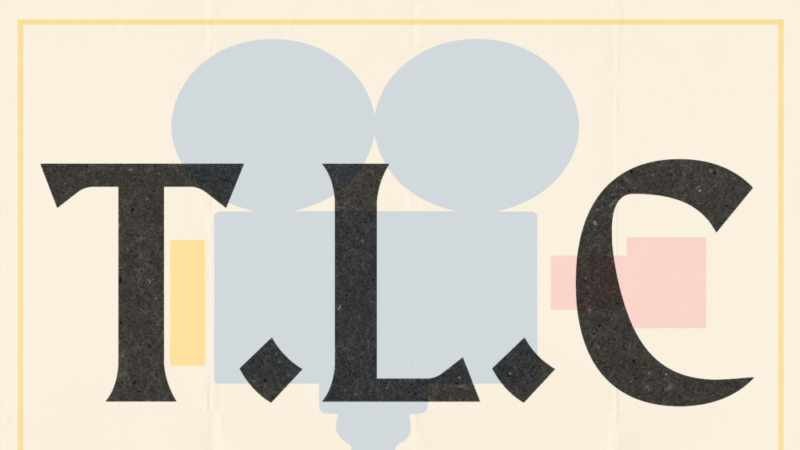
Trans Cinema: A new Podcast Mini-Series
Inclusive Cinema launches a new T.L.C. (aka Tender Loving Care for Trans-Led/Trans-Loved Cinema) podcast resource that is creating a space for the trans community and cis allies alike to celebrate, learn and share.
Over four episodes, trans curators, writers, and thinkers in the realm of cinema unpack some of the challenges and joys about being a trans person in cinema, offering stories, research and advice to champion trans-led and trans-loved cinema to help firmly establish it as part of the wider UK film exhibition landscape.
The podcast series and accompanying written resource documents a series of trans-focused film events from across the UK, from Orkney to London. Trans and non-binary programmers, filmmakers and speakers highlight the many ways to centre and celebrate trans cinema through rich insights and shared stories. Across in-depth intros, curious Q&As, friendly panels and engaged audience discussions, listeners and readers can expect to learn more about how to wholeheartedly support trans filmmakers and audiences.
Highlights of the podcasts include:
- An intimate introduction with Alice Blanc (they/them, founder of Trans+ on Screen) and Jaye Hudson (she/her, programmer at Fringe! Queer Film and Arts Festival London, and more), hosted by So Mayer (they/them). They talk through finding joy in film, safety strategies for trans team members in public events and creative thinking around the definition of ‘trans film’.
- A playful panel discussion in Hawick delving into trans representation and collaborative filmmaking with programmer Milo Clenshaw (he/him, Alchemy Film & Arts) and speakers Rosana Cade (they/them), Ivor McCaskill (he/him), Natalie Ferguson and Katie Somers (all independent artists and filmmakers)
- Insightful reflections on establishing a ‘trans film’ canon and how trans film can transcend not just gender binaries but established filmmaking norms by Lillian Crawford (she/her, freelance writer & researcher) talking about the classic Japanese Experimental film Funeral Parade of Roses.
- A rich Q&A between Juliet Jaques (she/her, writer and filmmaker) and Sarah Pucill (she/her, film artist), at the Lexi, London, delving deeper into Sarah’s film Magic Mirror (2013); experimental filmmaking, transness, and the potential of gender freedom through the medium of film.
- An exciting bonus episode to be released in spring, with programmer Bea Copland (she/her) in conversation with Laura Kate Dale (she/her) at the Phoenix Cinema in Orkney. Expect intriguing conversation around the intimate documentary Born to Be, which follows Dr. Jess Ting (he/him) offering gender affirming health care to trans and non-binary people in New York City.
The written resource will expand on these themes, offering answers to tricky questions around programming trans film and filmmakers developing best practice for organisations and independent organisers.
The podcast is launching on Podbean and will soon be available wherever you get your podcasts. You will find it on the Inclusive Cinema website along with additional written notes here.
T.L.C. aims to provide valuable advice to venues, practitioners and filmmakers looking to support trans inclusion in cinema, helping to address the historic imbalance of trans representation on screen.
So Mayer, project consultant, says:
Creating TLC has been a process of (gender) euphoria. As a creative team, we’re so grateful for the tender, loving care that went into sharing ideas about screening, discussing and promoting trans+ films; building community by networking speakers, filmmakers, venues and audiences; and creating long-lasting accessible, shareable resources to keep the project alive. We hope that listeners hear the passion and pride in the podcasts and resources, and that the wealth of insights and examples sets a spark for future opportunities for audiences to experience…
This project is led by Film Hub Wales and supported by the BFI Film Audience Network (FAN) – using funds from the National Lottery to ensure the greatest choice of cinema is available to everyone across the UK. Funds in Wales are administered by FHW via Chapter as the Film Hub Lead Organisation.
More than £30M is raised each week for good causes across the UK by the National Lottery.
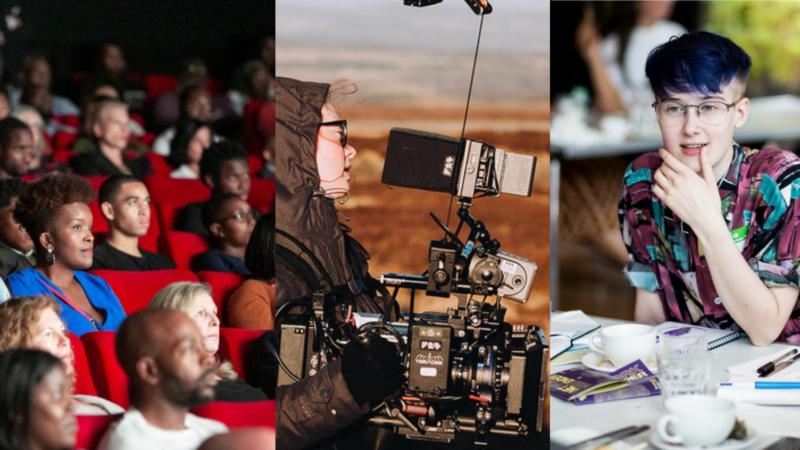
BFI awards over £15.2m to 11 UK-wide Strategic Partners
1st February, 2023
BFI awards £15.2M National Lottery funding over three years to 11 UK-wide strategic partners as it begins to implement its recently published 10-Year National Lottery Funding Strategy from April 2023. The partnerships will enable the BFI to grow the activity it supports UK-wide, building on frameworks and networks established since 2012. This ‘good cause’ National Lottery funding aims to grow cinema audiences for UK independent and international film, support development of new filmmaking talent and ignite a passion for screen culture in young people.
Pivotal in delivering one of the BFI’s core principles of being UK-wide, the BFI will work with key partners across the four nations to ensure its National Lottery funding effectively responds to the varying needs of the public and industry in different parts of the country. It will see many funding decisions devolved or taken collaboratively, and activity tailored by those on the ground who understand their local landscape, have valuable community networks, and can best reach people in their local area.
Partners selected and funded to lead on activity across the UK are:
- In London, Film London to manage BFI Film Audience Network (FAN) and BFI NETWORK activity
- In the Midlands, Broadway in Nottingham and Flatpack in Birmingham to manage BFI FAN, BFI NETWORK activity and BFI Film Academy Plus
- In the North, Showroom in Sheffield and HOME in Manchester to manage BFI FAN, BFI NETWORK activity and Film Academy Plus
- In Northern Ireland, Queen’s University Belfast to manage BFI FAN and BFI Film Academy Plus; Northern Ireland Screen will deliver talent development activity as part of BFI NETWORK
- In Scotland, Glasgow Film Theatre to manage BFI FAN and BFI Film Academy Plus; Screen Scotland will co-fund talent development activity as part of BFI NETWORK as well as support BFI FAN
- In the South East, the Independent Cinema Office to manage BFI FAN, BFI NETWORK activity and BFI Film Academy Plus
- In the South West, Watershed in Bristol to manage BFI FAN, BFI NETWORK activity and BFI Film Academy Plus
- In Wales, Chapter in Cardiff to manage BFI FAN and BFI Film Academy Plus; Ffilm Cymru Wales will deliver talent development activity as part of BFI NETWORK
Harriet Finney, Deputy CEO of the BFI, said:
Our partners are fundamental to the successful delivery of our ambitious National Lottery Strategy across the UK. We are very much looking forward to working with the venues and organisations announced today to ensure the BFI Film Audience Network, BFI NETWORK and BFI Film Academy Plus programmes evolve and grow to meet the changing needs of our sector. Driven by our belief everyone should have access to screen culture – from experiencing a diverse range of films in cinemas through to creating original screen works and a chance to forge careers – we are supporting these fantastic partners so they can bring those opportunities to local communities and people of all backgrounds, across the whole of the UK.
Access to a rich variety of screen culture inspires and informs our future filmmakers and creatives. The funding decisions announced today enable our partners to deliver three distinct but interconnected areas of work. These organisations will provide highly visible cultural hubs that are largely based out of independent cinemas and film venues across the UK. Crucially, the funded partners will make audience and talent development opportunities accessible to audiences, young people and aspiring filmmakers across their respective regions or nations.
Continuing to support this UK-wide structure also responds to a consistent message heard throughout the extensive consultation with public and industry undertaken to develop the strategy: that every part of the country has a different set of needs, opportunities and challenges around screen culture, and local organisations are best placed to respond to these. Further UK-wide partners will be announced in the coming weeks, as recipients of National Lottery funding to support skills and education activity which will complement this work. Alongside BFI FAN, support of the exhibition and distribution sector is available via the BFI National Lottery Audience Projects Fund which is currently open for applications.
The £15.2m announced today aims to address a number of primary objectives of the BFI’s National Lottery Strategy. These include seeking to:
- empower children and young people to develop their own relationship with a wider range of screen culture – as viewers, creators or as part of the future workforce
- ensure people across the UK can access a wider choice of film and the moving image, including stories that authentically reflect their lives
- tackle a range of social, economic and geographical barriers for UK audiences
- support the skilling up of the exhibition workforce so venues are better equipped to thrive in an increasingly challenging marketplace
- open up opportunities to those who want to express their creativity through stories on screen and support and nurture their careers
- encourage innovation and back a wide range of stories that wouldn’t otherwise be told
- open up equitable and more visible routes into the sector
A collaboration of eight leading venues or film organisations representing the UK nations and regions, the BFI Film Audience Network supports a stronger and more connected approach to growing audiences for UK and international film on the big screen. FAN has over 1,700 members comprising cinemas, festivals, mixed-arts venues, community cinema and film archives, which can access training, funding, programming support and network opportunities.
BFI NETWORK exists to support, develop and champion new and emerging filmmakers across the UK. Working with partners, NETWORK has an on-the-ground presence in every UK nation and region, led by BFI NETWORK Talent Execs, to connect with and deliver support to new and emerging filmmakers. BFI NETWORK offers funding for short films and first feature development, as well as a range of professional development support to writers, directors and producers.
BFI Film Academy Plus, the newly named UK-wide in-venue education offer, helps connect 16-25 year olds with opportunities to pursue their love of screen culture and learn how to set about a career in the industry. Funding will enable venues across the UK to provide locally tailored support packages such as masterclasses, screenings and bursaries, helping them to learn more about the film industry, watch cultural cinema, become familiar with their local venues and develop skills as independent filmmakers, film curators or film industry new entrants.
The BFI National Lottery Funding Strategy aims to build a diverse and accessible screen culture that benefits all of society and contributes to a prosperous UK economy. At its heart are three core principles: equity, diversity and inclusion, so everyone can develop a meaningful relationship with screen culture, regardless of their background or circumstances; UK-wide, so that everyone across the four nations of the UK should be able to experience and create the widest range of moving image storytelling; and environmental sustainability, from reducing the BFI’s own carbon emissions to supporting wider industry efforts to get to net zero and address biodiversity loss.
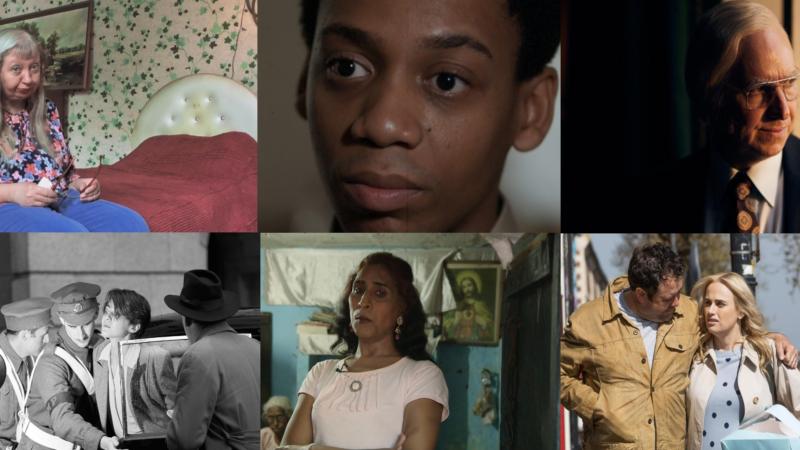
Welsh Films to Watch out for in Cinemas in 2023
Tuesday, 31st January 2023
Welcome in 2023 with a host of Welsh films for your cinema diary. Film Hub Wales has put together a selection of the most anticipated releases with Welsh connections, coming to a cinema near you this year.
First up is Timestalker. Produced by Pembrokeshire born Vaughan Sivell, the film tells the story of a time-travelling hopeless romantic (Alice Lowe) as she deals with love, death and reincarnation.
If biopics are more your thing, then look out for Y Sŵn from the Welsh creatives behind 2022 success Gwledd (Roger Williams and Lee Haven Jones), which tells the story of iconic politician Gwynfor Evans and the rise of S4C during the Thatcher era.
Also highly anticipated is The Almond and the Seahorse. Written by Llanarth based Kaite O’Reilly, with directorial debut from Anglesey born Celyn Jones and a soundtrack from Gruff Rhys (Super Furry Animals). The film stars Rebel Wilson as Sarah, an aspiring archaeologist, who is coming to terms with her partners traumatic brain injury.
Audiences can also look forward to international stories from Welsh storytellers, from South African apartheid (Comrade Tambo’s London Recruits) to the first transgender model agency (Being Hijra). These films offer crucial representation for minoritised communities, within a Welsh context, giving us a platform to shape how we see ourselves as a nation and how others see us from across the world.
Radha Patel, Film Hub Wales’ Made in Wales Officer explains:
Our local cinemas need us, just as much as we need them. All of these films say something about Wales whether they’re directly about our country or not. The most important thing is that we – as audiences – watch them, talk about them, voice what they say to us with our friends and online and continue to support local, independent, cinemas so that they can keep showing films that explore Wales’ cultural identity as times change.
Kaite O’Reilly, Writer of ‘The Almond and the Seahorse’ said:
The film has a long history and connection to Wales. I first wrote the theatre script in 2008 and the extraordinary response to the play made Celyn Jones and I determined to bring this ‘hidden’ story to the screen, to bring awareness, hope and the particularly reassuring reaction a collective experience brings. Cinema is special – it is remarkable to sit together across Wales with friends and strangers, to share a resonant moment and make noise about this ‘silent epidemic’ – to let people know they are not alone.
Emilie Barra, Head of Marketing at Signature Entertainment adds:
‘‘Here at Signature Entertainment, we are proud to be supporters of independent films and
we are particularly excited to have 2 upcoming Welsh films on our 2023 slate. The hyperoriginal and critically-lauded sci-fi thriller LOLA is an Ireland and UK production with Welsh elements and an outstanding debut by Andrew Legge.- an outstanding debut by Andrew Legge – and we’re also proud to also support prolific Welsh filmmaker Jamie Adams with his new star-studded romantic drama SHE IS LOVE. We look forward to collaborating with the Film Hub Wales and local cinemas to bring these gems to Welsh audiences’’
Film Hub Wales’ Made in Wales (MIW) project celebrates films with Welsh connections. It offers a host of year-round activities in partnership with Welsh exhibitors, including a film catalogue, which hosts over 600 shorts and features with Welsh connections.
Audiences can keep up to date with news of the upcoming Welsh releases on the Made in Wales section of Film Hub Wales’ website, or by following @Filmhubwales on social media.
MIW is made possible thanks to funding from Creative Wales and the BFI Film Audience Network (FAN), awarding funds from the National Lottery. BFI FAN offers support to exhibitors across the whole of the UK, to boost cultural programming and engage diverse audiences. In Wales, activity is led by Film Hub Wales, managed by Chapter.
-ENDS-